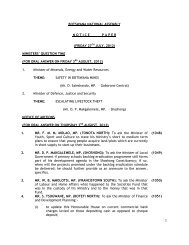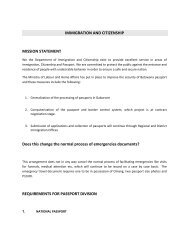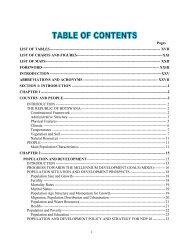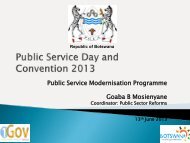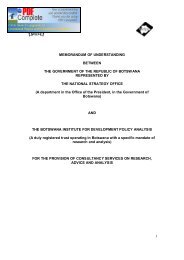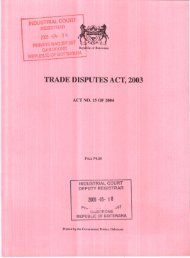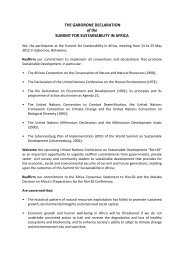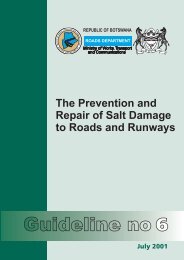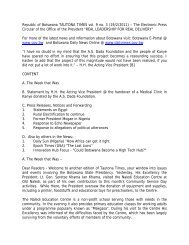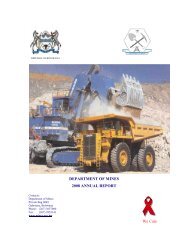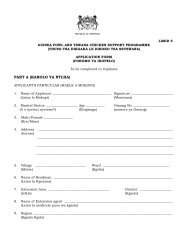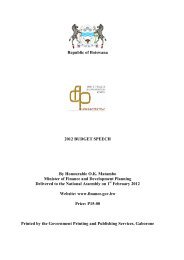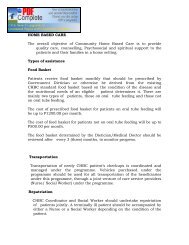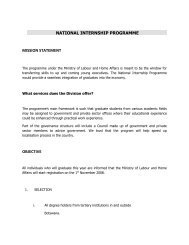7 and 8 - Government of Botswana
7 and 8 - Government of Botswana
7 and 8 - Government of Botswana
You also want an ePaper? Increase the reach of your titles
YUMPU automatically turns print PDFs into web optimized ePapers that Google loves.
● The Technical Audit is carried out by an independent, appropriately qualifi ed <strong>and</strong> experienced organisation in a manner<br />
prescribed in the Guideline <strong>and</strong> according to the requirements <strong>of</strong> the Model Terms <strong>of</strong> Reference for Technical Audits. All<br />
parties to the contract are audited <strong>and</strong> there must be no interference by any party to the audit process.<br />
● Technical Auditing does not duplicate the role or function <strong>of</strong> the Supervising Engineer. The audit process entails undertaking a<br />
number <strong>of</strong> prescribed activities that are carried out intermittently during the course <strong>of</strong> the project from pre-construction (review<br />
<strong>of</strong> tender documentation, design <strong>and</strong> drawings, specifi cations <strong>and</strong> BoQ) to post-construction (certifi cates, fi nal measurement<br />
<strong>and</strong> fi nal certifi cates.).<br />
● An option to the appointment <strong>of</strong> an external Technical Auditor would be the establishment <strong>of</strong> an in-house Technical Audit<br />
Unit. However, Roads Department does not currently have the resources for such a unit <strong>and</strong> recourse to the use <strong>of</strong> an external<br />
auditor will be necessary in the short to medium term.<br />
4.2 Closing Remarks<br />
Mr. Pinard’s closing remarks may be summarized as follows:<br />
● Attendance: Some eighty-two delegates have attended the seminar. This is testimony not only to the importance that they<br />
attach to the subject matter <strong>of</strong> the Guidelines, but also a demonstration <strong>of</strong> their wish to interact with other stakeholders in the<br />
roads sector in a manner that can only be benefi cial to all.<br />
● Constructive dialogue: There has been open <strong>and</strong> constructive dialogue <strong>and</strong> interaction amongst all stakeholders. A number <strong>of</strong><br />
important issues have been raised which is a refl ection <strong>of</strong> the knowledge base <strong>of</strong> the delegates. This has engendered much<br />
discussion in the course <strong>of</strong> which consensus has been reached on most, if not all, <strong>of</strong> the issues raised.<br />
● Use <strong>of</strong> the Guidelines: The real value <strong>of</strong> the Guidelines will only be realised if they are properly used by stakeholders. In this<br />
regard, the initiator <strong>of</strong> the Guidelines, the Roads Department, has an important role to play in terms <strong>of</strong> continually promoting<br />
the use <strong>of</strong> these Guidelines amongst all stakeholders.<br />
● Tribute to organizers: Finally, the organizers must be commended for their foresight in convening what all would agree has<br />
been a worthwhile, benefi cial seminar for all stakeholders.<br />
18<br />
Proceedings <strong>of</strong> Roads Department Workshop June 2003, Guidelines 7 <strong>and</strong> 8



